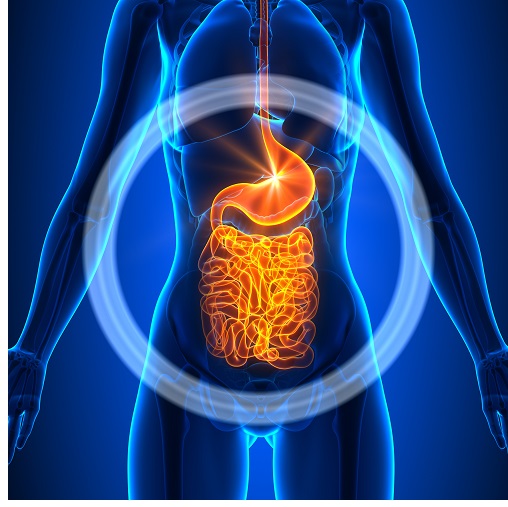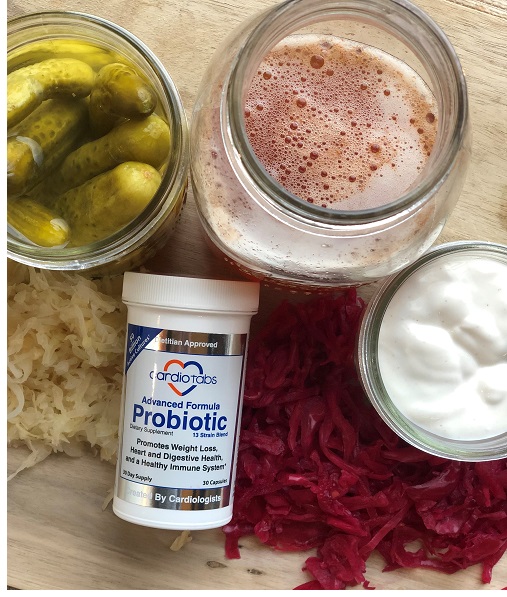You Contain Multitudes: Balance the Ecosystem Within
November 5, 2019
 Trillions of tiny organisms are living inside you right now, exerting profound effects on everything from your immunity, gut, and cardiac health, to your weight and mental well-being.* Countless bacteria inhabit our bodies - known collectively as the microbiome. Managing our microbiome has the promise to support overall health.
Trillions of tiny organisms are living inside you right now, exerting profound effects on everything from your immunity, gut, and cardiac health, to your weight and mental well-being.* Countless bacteria inhabit our bodies - known collectively as the microbiome. Managing our microbiome has the promise to support overall health.
As I write this, I’m eating a bowl of naturally fermented sauerkraut. Also on the menu for breakfast this morning: about seven baby dill pickles, a bowl of non-fat unsweetened Greek yogurt with berries and nuts, two cups of coffee, and unsweetened psyllium fiber mixed in water and gulped down. Joan taught me this - and it is a breakfast guaranteed to keep your gut happy and healthy with a robust microbiome.
This is not easy, which is why most Americans have GI (gastrointestinal) health that is not ideal. To cultivate a vibrant garden of beneficial organisms in your gut, you need to start by eating a mostly plant-based diet rich in fiber. Natural fiber from plant foods adds bulk to the stool and keeps the food and bacteria moving along through the small bowel to the colon. Once in the large intestine, the fiber is fermented into short-chain fatty acids, which help to prevent colon cancer.
Fermented foods, including sauerkraut, kimchi, kefir, kombucha, yogurt, and miso all contain bacteria that are beneficial to GI health and overall immunity. You should shoot for at least two servings of fermented food daily. We like to do this at breakfast, to start the day off right.
 The indigestible fibers present in plant-based foods are known as prebiotics - these are perfect for feeding the good bacteria in your intestines. Excellent sources of prebiotics include onions, garlic, artichokes, green bananas, oatmeal, berries, psyllium (Metamucil), and pickles.
The indigestible fibers present in plant-based foods are known as prebiotics - these are perfect for feeding the good bacteria in your intestines. Excellent sources of prebiotics include onions, garlic, artichokes, green bananas, oatmeal, berries, psyllium (Metamucil), and pickles.
The plant pigments found in red wine, green tea, black coffee, berries, cherries, pomegranates, and dark chocolate are polyphenols. These micronutrients are antioxidants that encourage the growth of beneficial bacteria in your gut while deterring pathogenic bad bacteria.
The people who won’t eat the kind of breakfast that Joan recommends might benefit from taking a probiotic. Most probiotics contain various Lactobacillus and Bifidobacterium species that help to seed the GI tract with bacteria and promote a hearty microbiome. If you take a probiotic, look for one that has a large number of bacteria, (at least 50 billion CFU per capsule) with several strains proven to have human benefits.
Sugar, as well as artificial sweeteners, promote the growth of bad bacteria, impair immunity, disturb your hormonal balance, and predispose to the deposition of fat tissue in and around your abdomen. If you are trying to grow a healthy microbiome, avoid all added sugars and other refined carbs, along with artificial sweeteners like the plague.
Antibiotics, prescribed to kill off the bad bacteria that are making you ill, also, cause a great deal of collateral damage by decimating the population of good bacteria in your system. If you have to take an antibiotic, make sure you are also eating some probiotic foods. Also, consider taking a multistrain probiotic to help repopulate your gut with good bacteria.
In Good Health,
James O'Keefe, MD and Joan O'Keefe, RD






